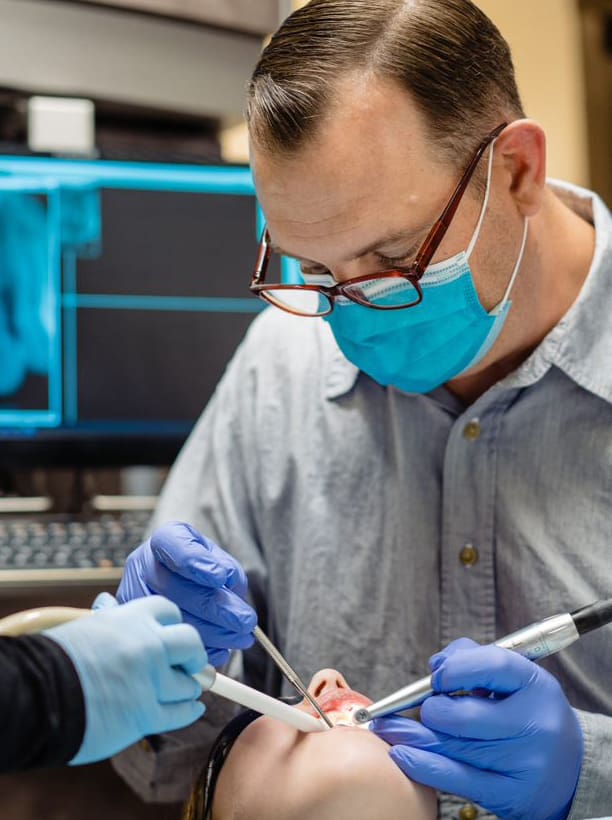Cavities, those unwelcome guests in our mouths, often sneak up without a loud announcement. They start small, almost invisible, but can quickly become a major concern if left unchecked. Recognizing the early signs of a cavity is crucial, as it can save you from more extensive dental work down the line.
It’s not just about a toothache; there are subtler signs to watch out for. From sensitivity to certain foods to visible changes in your teeth, knowing these signs can be your first line of defense.
Catching a cavity early can mean the difference between a simple filling and a more complex dental procedure. So, let’s dive in and arm ourselves with the knowledge to keep our smiles healthy and bright.

What Exactly Are Cavities and How Do They Form?
Cavities, known in the dental world as dental caries, are essentially small holes or openings in your teeth. They rank among the most common health issues across the globe, affecting individuals of all ages.
The formation of cavities is a gradual process, beginning with the slightest damage to the tooth enamel. This damage is primarily caused by a combination of factors: bacteria in your mouth, frequent snacking, and the consumption of sugary drinks.
When sugar enters the mouth, it becomes a feast for the bacteria in plaque. These bacteria then produce acids that relentlessly attack the tooth enamel. Over time, this acid assault weakens and breaks down the enamel, leading to the development of cavities.
Understanding how cavities form is a crucial step in prevention. It highlights the importance of maintaining diligent oral hygiene and being mindful of dietary choices to protect your teeth from decay.
How Do Bacteria, Sugar, and Acid Contribute to Cavity Formation?
The formation of cavities is a complex dance involving bacteria, sugar, and acid, each playing a pivotal role in this dental drama.
- Bacteria: The Starting Point: Your mouth is home to numerous bacteria, some of which are beneficial, but others, particularly those in plaque, can be harmful. These bacteria are the primary actors in the cavity formation process.
- Sugar: Fuel for Bacteria: When you consume sugary foods or drinks, these bacteria get to work, feeding on the sugar and creating a feast that leads to dental troubles.
- Acid: The Damaging Byproduct: As bacteria digest sugar, they produce acid. This acid is the real culprit behind cavity formation, as it gradually erodes the tooth enamel, creating the perfect setting for cavities to develop.
Understanding this trio’s role in cavity formation underscores the importance of reducing sugar intake and maintaining good oral hygiene to keep harmful bacteria in check and protect your teeth from acidic damage.
What Are the Early Warning Signs of a Cavity?
Spotting a cavity in its early stages can save you from discomfort and more complex dental procedures down the line. The initial signs are subtle yet telling. You might notice increased tooth sensitivity, particularly when you consume hot, cold, or sweet foods and drinks. Another early indicator can be visible discoloration on the tooth surface, often appearing as white spots. In some cases, minor toothache or discomfort when biting down can also signal the onset of a cavity. Paying attention to these early signs and seeking prompt dental care can help nip the problem in the bud, keeping your smile healthy and pain-free.

How Does Tooth Sensitivity Signal a Potential Cavity?
Tooth sensitivity is often one of the first red flags indicating a cavity might be forming. This sensitivity can manifest in various ways, each pointing to the early stages of tooth decay.
- Reaction to Temperature: If you find yourself wincing when sipping hot coffee or eating ice cream, it could be a sign. The discomfort from hot or cold foods and drinks occurs when the tooth enamel wears down, exposing the sensitive dentin underneath.
- Sensitivity to Sweetness: Similarly, a twinge of pain or discomfort when eating sweets can also be an early indicator. The sugar in these foods can penetrate weakened enamel, irritating the tooth’s nerves.
These signs of sensitivity shouldn’t be ignored. They’re your teeth’s way of waving a flag for attention, indicating it’s time to consult your dentist. Catching a cavity at this stage can make treatment simpler and less invasive.
What Do Visible Pits or Holes on Your Teeth Indicate?
When cavities progress, they can lead to visible pits or holes on the surface of your teeth, a clear sign that tooth decay has set in.
- Direct Signs of Decay: These indentations are the physical manifestations of the enamel being eroded away by acids produced by bacteria. They are often noticeable upon close inspection and can sometimes be felt with the tongue.
- Not Just Surface Deep: While these pits or holes may seem small, they can extend deeper into the tooth, leading to more significant issues if left untreated.
The appearance of visible pits or holes on your teeth is a definitive signal that a cavity has formed and requires immediate attention from a dental professional. Addressing these signs early can prevent further decay and more extensive dental procedures.
Is Persistent or Spontaneous Tooth Pain a Sign of a Deeper Cavity?
A toothache, especially one that’s persistent or occurs spontaneously, can be a telltale sign of a deeper cavity.
- Persistent Pain: This type of discomfort is often a signal that the decay has reached the inner layers of the tooth, affecting the nerves and causing continuous pain.
- Spontaneous Pain: Sudden, sharp pain, particularly when biting down or eating, can indicate that a cavity has progressed significantly.
Such tooth pain shouldn’t be taken lightly, as it suggests that the cavity has moved beyond the early stages and requires prompt dental intervention to prevent further damage and restore dental health.
What Can Dark Spots or Discoloration on Teeth Indicate?
Dark spots or discoloration on your teeth are often more than just cosmetic concerns; they can be indicators of tooth decay.
- Signs of Decay: These darkened areas can signify where the tooth enamel has been compromised, allowing decay to set in.
- Beyond Surface Stains: Unlike surface stains from food or drinks, these spots are often indicative of an underlying cavity that needs dental attention.
Noticing dark spots or changes in tooth coloration is a reason to visit your dentist, as it could be a sign that a cavity is forming or has already developed. Early detection and treatment are key to maintaining oral health.
Can Constant Bad Breath or a Bad Taste Indicate Cavities?
Persistent bad breath or a lingering bad taste in your mouth can sometimes be linked to cavities.
- Hidden Decay: Cavities provide a space for bacteria to thrive, and as they break down food particles, they can produce foul-smelling odors.
- Infection Signs: A bad taste, especially when accompanied by pain or discomfort, can be a sign of an infection in a cavity.
These symptoms are important to heed as they can indicate not just surface-level issues but deeper dental decay that requires professional attention. If you’re experiencing constant bad breath or a persistent bad taste, it’s advisable to consult with your dentist to check for cavities or other dental issues.
Understanding the Connection Between Gum Issues and Cavities
Swelling or bleeding gums can sometimes be more than just signs of gum disease; they can also indicate the presence of cavities.
- Cavities Near the Gum Line: When cavities develop near the gum line, they can cause irritation and inflammation, leading to swollen gums.
- Bleeding Gums as a Warning Sign: Similarly, bleeding gums, especially when brushing or flossing, can be a sign that decay has reached close to or under the gum tissue.
These gum issues, often overlooked as mere gum disease symptoms, can sometimes point to deeper dental problems like cavities. It’s important to pay attention to these signs and consult with a dentist for a comprehensive evaluation.
How Can You Prevent Cavities from Forming?
Preventing cavities is largely about maintaining diligent oral hygiene and making smart lifestyle choices. Regular brushing with fluoride toothpaste, flossing daily, and using mouthwash can significantly reduce the risk of cavities by removing plaque and food particles. Incorporating a balanced diet, low in sugary and acidic foods, also plays a crucial role in cavity prevention.

A regular dental check-ups are essential, as they allow for early detection and treatment of any dental issues. Staying hydrated to maintain saliva flow, avoiding frequent snacking, and considering dental sealants, especially for children, are other effective strategies to keep cavities at bay.
Proper Brushing Techniques:
Brushing your teeth twice a day with fluoride toothpaste is fundamental. Use gentle circular motions to clean all surfaces of your teeth, and don’t rush – spend at least two minutes each time.
Daily Flossing is Key:
Flossing daily helps remove plaque and food particles from between your teeth and under the gum line, areas your toothbrush can’t reach. It’s crucial for preventing cavities in these often-neglected spaces.
Regular Dental Check-Ups:
Visiting your dentist regularly for check-ups and cleanings is essential. These visits allow for the early detection and treatment of cavities, as well as professional cleanings that can prevent decay.
Incorporating these practices into your daily routine can significantly reduce your risk of developing cavities. Remember, prevention is always better than cure when it comes to dental health.
Understanding the signs of a cavity is crucial in maintaining not just your oral health but your overall well-being. By recognizing these early indicators, you can take proactive steps to prevent further decay and ensure your smile stays healthy and bright. Remember, the key to combating cavities lies in consistent and effective oral hygiene practices, coupled with making informed lifestyle choices.
Don’t let cavities take a toll on your dental health. If you’re noticing any signs of a cavity or just want to ensure your teeth are in top shape, Thomas Dentistry is here to help. Our team of experienced dental professionals is dedicated to providing you with the best care and advice for maintaining a healthy smile. Schedule your appointment with us today for a thorough check-up, personalized dental care plan, and peace of mind knowing your smile is in good hands. Contact Thomas Dentistry now and take a proactive step towards a cavity-free life!
